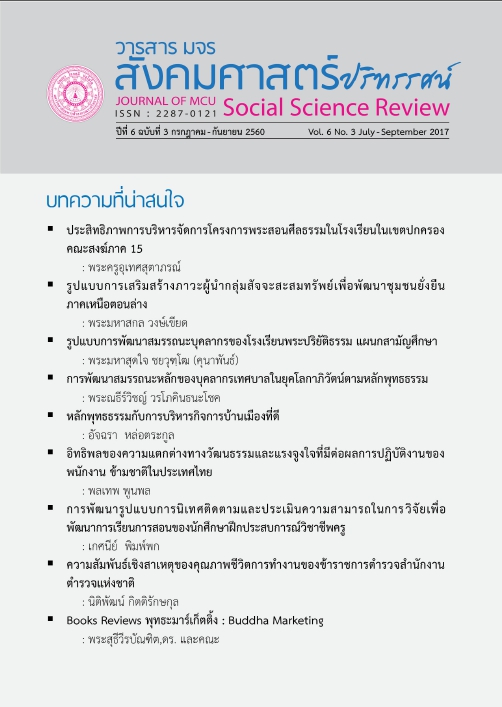การพัฒนาสมรรถนะหลักของบุคลากรเทศบาลในยุคโลกาภิวัตน์ตามหลักพุทธธรรม
คำสำคัญ:
การพัฒนาสมรรถนะหลัก เทศบาล หลักพุทธธรรม ยุคโลกาภิวัตน์บทคัดย่อ
บทความวิจัยนี้มีวัตถุประสงค์ คือ 1) เพื่อศึกษาสมรรถนะหลักของบุคลากรเทศบาล 2) เพื่อศึกษาองค์ประกอบพุทธธรรมในการพัฒนาสมรรถนะของบุคลากรเทศบาล และ 3) เพื่อนำเสนอวิธีการพัฒนาสมรรถนะหลักของบุคลากรเทศบาลในยุคโลกาภิวัตน์ตามหลักพุทธธรรม ระเบียบวิธีวิจัยใช้การวิจัยเชิงคุณภาพ (Qualitative research) เก็บข้อมูลจากผู้ให้ข้อมูลหลัก โดยเลือกผู้ทรงคุณวุฒิแบบเจาะจงเฉพาะ คือนักวิชาการด้านพระพุทธศาสนา นักวิชาการด้านองค์กรปกครองส่วนท้องถิ่น และทางรัฐประศาสนศาสตร์ ผู้บริหารองค์การเทศบาล ผู้ปฏิบัติงานเทศบาล และประชาชน จำนวน 28 รูป/คน เครื่องมือในการเก็บข้อมูลได้แก่แบบสัมภาษณ์เชิงลึก (In-depth Interview) ที่มีโครงสร้าง เก็บข้อมูลด้วยการสัมภาษณ์แบบตัวต่อตัว และเก็บข้อมูลจากผู้มีส่วนร่วมในการสนทนากลุ่มเฉพาะ (Focus Group Discussion) จำนวน 9 รูป/คน วิเคราะห์ข้อมูลจากทั้งสองขั้นตอนโดยการพรรณนาความ
ผลการศึกษาพบว่า
- 1. สมรรถนะหลักของบุคลากรเทศบาล มี 5 ด้าน คือ 1.การมุ่งผลสัมฤทธิ์ 2.การยึดมั่นความถูกต้องชอบธรรมและจริยธรรม 3.ความเข้าใจในองค์กรและระบบงาน 4.บริการเป็นเลิศ
การทำงานเป็นทีม ใช้วิธีการพัฒนาสมรรถนะ คือ พัฒนาปรับปรุงสภาพแวดล้อมหน่วยงาน ระบบโครงสร้างองค์กร พัฒนาปรับปรุงระเบียบ กฎเกณฑ์คำสั่ง การสร้างอุปนิสัยใฝ่ความเป็นเลิศ การสร้างจิตสำนึก ปลูกฝังจิตสาธารณะ ปรัชญาและอุดมคติ การสร้างแรงจูงใจ การพัฒนาความรู้ ทักษะ ความเชี่ยวชาญ การประยุกต์หลักธรรม การมีส่วนร่วม และการพัฒนาความรู้ทางพระพุทธศาสนา - 2. องค์ประกอบพุทธธรรมในการพัฒนาสมรรถนะของบุคลากรเทศบาล คือ
(1) หลักภาวนา 4 (กายภาวนา), หลักอิทธิบาท 4, หลักพละ 5 ใช้พัฒนาสมรรถนะด้านการมุ่งผลสัมฤทธิ์ (2) หลักภาวนา 4 (ศีลภาวนา), หลักศีล 5, หลักอริยสัจ 4, หลักหิริ โอตตัปปะ
ใช้พัฒนาสมรรถนะด้านการยึดมั่นความถูกต้องชอบธรรมและจริยธรรม (3) หลักภาวนา 4 (ปัญญาภาวนา), หลักสิกขา 3, หลักสัปปุริสธรรม 7, หลักมรรค 8, หลักกาลามสูตร ใช้พัฒนาสมรรถนะด้านความเข้าใจในองค์กรและระบบงาน (4) หลักภาวนา 4 (จิตตภาวนา), หลักกรรมฐาน 2, หลักมหาสติปัฎฐาน 4, หลักสังคหวัตถุ 4, หลักพรหมวิหาร 4, หลักปธาน 4, หลักฆราวาสธรรม 4, ความอดทน, ความกตัญญู ใช้พัฒนาสมรรถนะด้านบริการเป็นเลิศ (5) หลักภาวนา 4 (ปัญญาภาวนา), หลักสังคหวัตถุ 4, หลักสาราณียธรรม 6, หลักอปริหานิยธรรม 7 ใช้พัฒนาสมรรถนะด้านการทำงานเป็นทีม
3. วิธีการพัฒนาสมรรถนะหลักของบุคลากรเทศบาลในยุคโลกาภิวัตน์ ตามหลักพุทธธรรม (1) ด้านการมุ่งผลสัมฤทธิ์ตามหลักพุทธธรรม เน้นส่งเสริมพัฒนากายภาวนา โดยปรับปรุงพัฒนาสภาพแวดล้อม ระบบการทำงาน ส่งเสริมบุคลากรให้มีสุขภาพที่ดี ประยุกต์หลักอิทธิบาท 4 หลักพละ 5 ในการพัฒนาสมรรถนะให้เข้มแข็งมากยิ่งขึ้น (2) ด้านการยึดมั่นความถูกต้องชอบธรรมและจริยธรรม ตามหลักพุทธธรรม เน้นส่งเสริมพัฒนาด้านศีลภาวนา ส่งเสริมให้มีความซื่อสัตย์สุจริต มีมโนธรรม มีหิริ โอตตัปปะ รักษาศีล 5 ประพฤติตามระเบียบ คำสั่ง จรรยาบรรณของข้าราชการ มีเกณฑ์ชี้วัดด้านจริยธรรม พัฒนาความรู้ทางพระพุทธศาสนาด้วยการส่งเสริมให้เข้าวัด ฝึกอบรมปฏิบัติกรรมฐาน ฟังธรรมบรรยาย (3) ด้านความเข้าใจในองค์กรและระบบงานตามหลักพุทธธรรม เน้นส่งเสริมพัฒนาด้านปัญญาภาวนา เพิ่มพูนความรู้ ความเข้าใจ ทักษะ ความเชี่ยวชาญด้วยการศึกษา อบรม สร้างแรงจูงใจให้บุคลากรรักการเรียนรู้ จัดทำองค์ความรู้หน่วยงานให้เป็นระบบ ทำให้เป็นองค์กรแห่งการเรียนรู้ตลอดเวลา ประยุกต์หลักสิกขา 3 หลักสัปปุริสธรรม 7 หลักมรรค 8 หลักกาลามสูตรในการพัฒนาสมรรถนะ (4) ด้านบริการเป็นเลิศตามหลักพุทธธรรม เน้นส่งเสริมพัฒนาด้านจิตตภาวนา ปลูกฝังให้มีจิตวิญญาณพระโพธิสัตว์ มีจิตสาธารณะ มีอุดมคติ มีปรัชญาในการทำงาน ให้บริการเสมอภาคเท่าเทียมกัน ปราศจากอคติลำเอียง ส่งเสริมให้แรงจูงใจ ส่งเสริมให้ประพฤติปฏิบัติธรรม นำหลักกรรมฐาน 2 หลักมหาสติปัฎฐาน 4 หลักสังคหวัตถุ 4 หลักพรหมวิหาร 4 หลักปธาน 4 และความอดทนประยุกต์ใช้ในการพัฒนาสมรรถนะ เป็นการส่งเสริมให้มีจิตสาธารณะเพิ่มมากยิ่งขึ้น (5) ด้านการทำงานเป็นทีมตามหลักพุทธธรรม คือ เน้นพัฒนาด้านปัญญาภาวนา พัฒนาความรู้ ทักษะ ความเชี่ยวชาญ ด้วยการเปิดให้มีส่วนร่วมจากสมาชิก การระดมความคิด การเวียนงาน การสลับกันทำงาน การแลกเปลี่ยนเรียนรู้ การศึกษาดูงาน มีกิจกรรมสัมพันธ์ในองค์กร อบรมแบบวอคแรลลี่ การประเมินกันในทีม ประยุกต์หลักสังคหวัตถุ
4 หลักสาราณียธรรม 6 หลักอปริหานิยธรรม 7 ใช้พัฒนาสมรรถนะการทำงานเป็นทีม
เอกสารอ้างอิง
Mayuree Kamolabutra. (2013). The Development of the Competency of Front Line Nurse Managers at Hospitals Under the Jurisdiction of the Ministry of Public Health (Doctoral Dissertation). Bangkok: Ramkhamhaeng University.
National Reform Steering Assembly. (2558, January 13). Summary of the Draft Act of the Code of the local administrative organization, Retrieved from http://www.library2.parliament.go.th/giventake/content_nrsa2558/d082259-04.pdf
Paitoon Jaikaona. (2557,May-August). Management to Concentrate on the Development Of Buddhism. Journal of MCU Social Science Review, 3(2), 81.
Phrakru Kosonwachirakit, (2559,May-August). The Strategy of Buddhist Human Resources Development of Local Administrative Organizations in Kampangpet Province. Journal of MCU Social Science Review, 5(1), 58.
Phrapalad Thian Palawutho. (2557). Training and Development of Personnel in The Organization, Buddhist integrated approach to mental and social development, 1 (No.2), 82.
PhraSrikhamphirayarn (Somjin Sammapanno). (2557). Statement, Buddhist integrated approach to mental and social development, 1(No.1), 7.
Siam Development Institute. (2549). The empowerment in administrative management of the local administrative organization (Research report), Bangkok: Siam Development Institute: 41-42.
Standards Committee of Local administration. (2558). Set the standard of Local administration No. 4, Bangkok: cabinet and The Government Gazette.
Supit Chaimongkol. (2556). Strategies for Develop Competency Active Learning of Elementary Teachers on Highland (Doctoral Dissertation). Chiangrai: Chiang Rai Rajabhat University.
Suttayan Aobaom. (2558,May-August). The Personnel’s Competency Development for Staff of Local Administrative Organization According to Buddhism, Journal of MCU Social Science Review. 4(2) special Issue. 193.
Weerachai Seehapon, (2559), The Significant Performance Strengthening of Students According to Core Curriculum for Basic Education in B.E.2551 by the Buddhist Concept, December 2556-May 2557. FEU ACADEMIC REVIEW, 7(2), 70.
ดาวน์โหลด
เผยแพร่แล้ว
รูปแบบการอ้างอิง
ฉบับ
ประเภทบทความ
สัญญาอนุญาต
ลิขสิทธิ์ (c) 2018 วารสาร มจร สังคมศาสตร์ปริทรรศน์

อนุญาตภายใต้เงื่อนไข Creative Commons Attribution-NonCommercial-NoDerivatives 4.0 International License.
เพื่อให้เป็นไปตามกฎหมายลิขสิทธิ์ ผู้นิพนธ์ทุกท่านต้องลงลายมือชื่อในแบบฟอร์มใบมอบลิขสิทธิ์บทความให้แก่วารสารฯ พร้อมกับบทความต้นฉบับที่ได้แก้ไขครั้งสุดท้าย นอกจากนี้ ผู้นิพนธ์ทุกท่านต้องยืนยันว่าบทความต้นฉบับที่ส่งมาตีพิมพ์นั้น ได้ส่งมาตีพิมพ์เฉพาะในวารสาร มจร สังคมศาสตร์ปริทรรศน์ เพียงแห่งเดียวเท่านั้น หากมีการใช้ภาพหรือตารางหรือเนื้อหาอื่นๆ ของผู้นิพนธ์อื่นที่ปรากฏในสิ่งตีพิมพ์อื่นมาแล้ว ผู้นิพนธ์ต้องขออนุญาตเจ้าของลิขสิทธิ์ก่อน พร้อมทั้งแสดงหนังสือที่ได้รับการยินยอมต่อบรรณาธิการ ก่อนที่บทความจะได้รับการตีพิมพ์ หากไม่เป็นไปตามข้อกำหนดเบื้องต้น ทางวารสารจะถอดบทความของท่านออกโดยไม่มีข้อยกเว้นใดๆ ทั้งสิ้น





